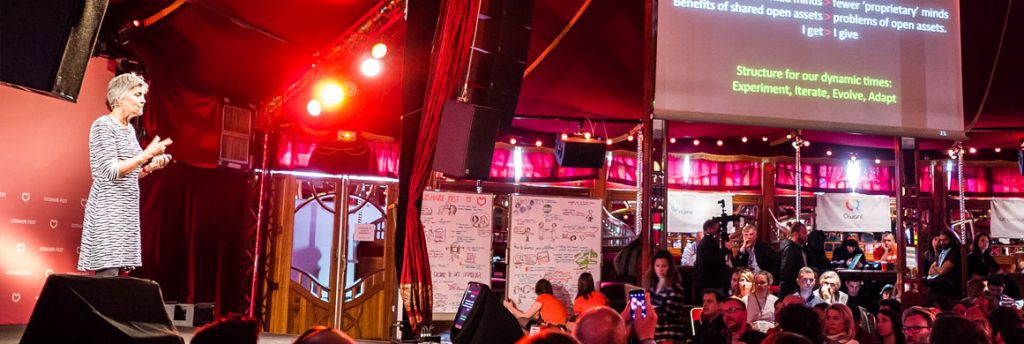Robin Chase, MIT Sloan Graduate School of Management MBA (1986) and co-founder of Zipcar, is a visionary in the brave new world of the sharing economy and peer-to-peer technology.
It’s easy to take for granted the omnipresence of the sharing economy in our everyday lives. For some millennials, it’s hard to recall that there was ever a time before they could walk outside, wave a gadget to a car windshield, and go on an unexpected road trip.
Robin Chase’s Zipcar gave birth to a phenomenon.
A Global Upbringing
A childhood spent in the Middle East (her father was an American diplomat) provided Chase with a wide worldview that undoubtedly informed her sense of the ways in which different economies succeed. Immersion in a culture with vastly different values than those of the West taught her several defining lessons.
“[Growing up in the Arab world I learned]… that Americans, in particular, lack an appreciation for how incredibly lucky the circumstances of their birth are… Being a white well-educated American who doesn’t have any immediate family in distress — that was just like a birthright. What a lucky thing,” she said in a 2015 Huffington Post profile.
Robin Chase, Co-founder of Zipcar
This knowledge of her own fortunate circumstances and of those who did not have the inherent privilege of being white and middle class in America imbued Chase with the desire to lead what she has described a “low-consumption, low-footprint life”.
Realizing the “low-consumption, low-footprint life”
Ten years before Airbnb and Uber, Chase and her founding partner Antje Danielson launched the idea that would spawn a movement. Both women were working mothers whose children had been in kindergarten together. Chase, armed with her MBA, was looking to start her own business as her children advanced through school. Danielson likewise was pursuing an advanced degree at Harvard with a focus on transportation accessibility. Over coffee one day, the women hatched the notion of a car sharing business.
In the late ‘90s, Chase was living in Cambridge, and took notice of the fact that the high-density city, with a large commuter population, could benefit from a car-sharing system like those that she had seen overseas. After the two met through Antje Danielson’s husband, they clicked into gear to sketch the idea for what would become Zipcar.
The Birth of Zipcar and Car-Sharing
Extensive research showed the team that car-sharing was poised to take off, and that they’d better act fast to catch the rising wave. Chase consulted with her mentor from Sloan, then Dean Glen Urban. His reaction was immediate. Sensing the imminent trend that was about to explode, Urban remarked, “‘Your business plan is way too slow. You’ve got to scale it up by a factor of three.’ “
Chase and Danielson took this advice seriously, and set out to expand the business. An angel investment of $50K and a series of intense brainstorming sessions transformed the idea into reality.
Since Zipcar’s inception, Chase has gone on to form Buzzcar, recently acquired by Drivy, in France; and online ride-sharing community GoLoco. As if she wasn’t busy enough defining the cutting edge of sharing technology, she formed Veniam, which, according to its website, “delivers the Internet of moving things”. Veniam offers technology that transforms vehicles, including buses, taxis and sanitation trucks into mobile hotspots. With the ultimate goal of creating smart cities, Veniam carries implications for increased safety, traffic reduction, and access for those who do not possess in-home Wi-Fi.
At a recent iCONIC conference in Seattle, Chase made a bold prediction. “Ultimately we will share everything and we will have to share everything.” Chase has spoken and written extensively on the need for workers to adjust to, and to affect, shifting prevalence of capitalism. The on-demand nature of the modern economy, including the rise of technology to replace human labor, has forced many into the freelance economy that holds far less certainty than full-time work. This is an opportunity, Chase believes, for those who are part of this economy to maximize on already existing resources.
Chase recently published Peers Inc which examines the future of the collaborative economy. She also regularly delivers speaking engagements, including several TED talks, and serves as an Advisory Board Member of the World Resources Institute.
